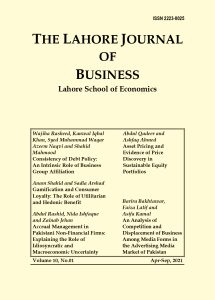Accounting without a General Ledger: Insights from Micro, Small and Medium Enterprises in Pakistan
- Muhammad Asif Jaffer
- masif@iba.edu.pk
- Assistant Professor Accounting at School of Business Studies, IBA, Karachi, Pakistan
- (Corresponding Author)
Submitted
November 22, 2023
Accepted
November 22, 2023
Accepted
November 22, 2023
- Received
- 3 January 2024
- Revised
- 18 April 2024
- Accepted
- 29 October 2024
Abstract
This study examines the formality of accounting practices within Pakistan’s micro, small
and medium enterprises (MSMEs). Data was gathered from 110 MSMEs located in Karachi,
Pakistan. The research focused on eight dimensions of accounting systems: chart of accounts, payroll
records, receipt and payment records, party ledgers, employee time records, segregation of duties,
documentary support, and budgetary control. These dimensions were analyzed in relation to four
firm-level attributes: organization type, firm size, firm age, and type of business. The results indicate
that most firms do not utilize these accounting dimensions, a finding that is consistent across various
firm ages and business types. However, firm size shows some association with the utilization of four
of the eight dimensions. The implications of these findings are discussed in the context of agency and
institutional theories, and some policy recommendations are provided. Future research could use this
exploratory study to investigate the motivations and structural barriers that influence the adoption
or avoidance of formal accounting practices by MSMEs, as well as how these enterprises use
accounting information and the challenges they encounter.
Keywords
Accounting practices
accounting records
SMEs
determinants of formal accounting practices
entrepreneurial ventures
This work is licensed under LJB.
- Citation
Jaffer, M. A. (2024). Accounting without a General Ledger: Insights from Micro, Small and Medium Enterprises in Pakistan. The Lahore Journal of Business, 12(1), 113-134.
- References
- Ahmad, K. (2017). The implementation of management accounting practices and its relationship with performance in small and medium enterprises. International Review of Management and Marketing, 7(1), 342–353.
- Alattar, J. M., Kouhy, R., & Innes, J. (2009). Management accounting information in micro enterprises in Gaza. Journal of Accounting and Organizational Change, 5(1), 81–107.
- Armitage, H. M., Webb, A., & Glynn, J. (2016). The use of management accounting techniques by small and medium sized enterprises: A field study of Canadian and Australian practice. Accounting Perspectives, 15(1), 31–69.
- Asaduzzaman, M. (2016). Accounting and financial reporting practices of SMEs: Bangladesh perspective. Malaysian Journal of Business and Economics, 3(1), 57–67.
- Bakhsh, A., Mahmood, Z., & Chaudhry, S. (2019). The adoption of management accounting practices (maps) in small and medium enterprises (SMEs) of Pakistan. Journal of Accounting and Finance in Emerging Economies, 5(2), 243–260.
- Bui, N. T., Le, O. T. T., & Nguyen, P. T. T. (2020). Management accounting practices among Vietnamese small and medium enterprises. Asian Economic and Financial Review, 10(1), 94.
- Busieney, S. K. (2012). Factors influencing the use of accounting services by small and medium enterprises in Kenya (Unpublished doctoral dissertation). University of Nairobi, Kenya.
- Chelimo, J. K., & Sopia, I. O. (2014). Effects of bookkeeping on growth of small and medium business enterprises in Kabarnet Town, Baringo County, Kenya. International Journal of Science and Research, 3(12), 432–437.
- DiMaggio, P. J., & Powell, W. W. (1983). The iron cage revisited: Institutional isomorphism and collective rationality in organizational fields. American Sociological Review, 48(2), 147–160.
- Dlamini, B. (2022). Factors influencing the use of management accounting practices among SMEs in emerging economies: A case of Zimbabwe. Journal of Accounting and Management, 12(2), 177–194.
- Esmeray, A. (2016). The impact of accounting information systems (AIS) on firm performance: empirical evidence in Turkish small and medium sized enterprises. International Review of Management and Marketing, 6(2), 233–236.
- Fatoki, O. (2012). An investigation into the financial management practices of new micro-enterprises in South Africa. Journal of Social Sciences, 33(2), 179–188.
- Ibrahim, F., Ali, D. N. H., & Besar, N. S. A. (2020). Accounting information systems (AIS) in SMEs: Towards an integrated framework. International Journal of Asian Business and Information Management, 11(2), 51–67.
- Ikem, O. C., Chidi, O. F., & Titus, I. T. (2012). Financial challenges of small and medium-sized enterprises (SMES) in Nigeria: The relevance of accounting information. Review of Public Administration and Management, 1(02), 248–276.
- Isa, C. R., Saleh, Z., & Sapiei, N. S. (2008). A survey on financial and management accounting practices among small and medium enterprises in Malaysia. Asian Journal of Accounting Perspectives, 1(1), 13–25.
- Ismail, N. A., & King, M. (2005). Firm performance and AIS alignment in Malaysian SMEs. International Journal of Accounting Information Systems, 6(4), 241–259.
- Jensen, M. C., & Meckling, W. H. (1976). Theory of the firm: Managerial behavior, agency costs and ownership structure. Journal of Financial Economics, 3(4), 305–360.
- Kahsay, G., & Zeleke, G. (2019). Factors affecting use of accounting records on small and micro enterprises (the case of Debre Birhan City, Ethiopia). Journal of Investment and Management, 8(1), 1–7.
- Kung’u, G. K. (2011). Factors influencing SMEs access to finance: A case study of Westland Division, Kenya (MPRA Paper No. 66633). https://mpra.ub.uni-muenchen.de/66633/
- Kurniawati, E. P., & Hermawan, F. E. P. (2012). Accounting for small and medium enterprises (SMEs) (Working Paper). Bharathidasan Institute of Management.
